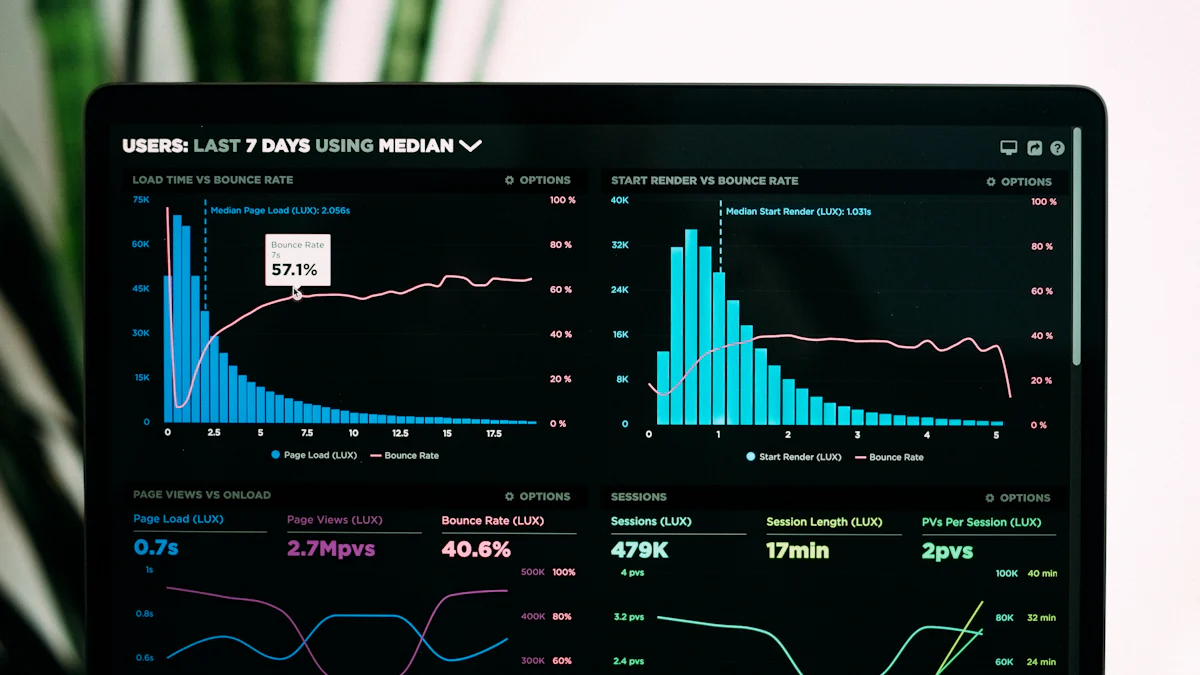Unveiling the Impact of Technology on Market Trends

Technology plays a pivotal role in shaping market trends, influencing how businesses operate and compete. Understanding these impacts is crucial for staying ahead in the dynamic business landscape. In this blog, key areas such as Algorithmic Trading, Information Access, and the Evolution of Stock Trading will be explored to shed light on the profound influence of technology on market trends.
Impact of Technology on Market Trends
Algorithmic Trading
In the realm of trading, Algorithmic Trading stands as a powerful tool reshaping market dynamics. Its definition lies in the utilization of algorithms to execute trades swiftly and efficiently, significantly impacting the financial world. The significance of this approach is evident in its ability to process vast amounts of data at unparalleled speeds, allowing users to make informed decisions promptly.
When delving into the realm of Algorithmic Trading, it's essential to acknowledge its various benefits and challenges. One key advantage is the automation it brings to trading activities, enabling investors to capitalize on opportunities swiftly. On the flip side, challenges such as system failures or erroneous algorithms can lead to significant financial losses if not carefully monitored.
Information Access
The aspect of Information Access plays a pivotal role in shaping market trends by providing investors with real-time data availability. This instantaneous access to crucial information allows traders to stay ahead of market movements and make timely decisions that align with their investment strategies.
Moreover, the impact of this real-time data on decision-making cannot be overstated. By leveraging up-to-the-minute information on stock prices, market trends, and global events, investors can adjust their positions swiftly and capitalize on emerging opportunities within the dynamic stock market landscape.
Evolution of Stock Trading

Historical Perspective
The modern stock market traces its origins back to the late 1700s and early 1800s, a period marked by significant developments in financial markets. Major stock exchanges such as the London Stock Exchange and the New York Stock Exchange were established during this era, laying the foundation for the structured trading of securities. This pivotal moment in history democratized stock trading, allowing individuals and institutions to participate in the market on a larger scale.
During the early 1600s, Amsterdam witnessed a groundbreaking event with the establishment of the Dutch East India Company in 1602. This marked the introduction of formal trading of company shares and bonds, setting a precedent for future stock exchanges worldwide. The evolution of stock trading from informal transactions to organized markets revolutionized how businesses raised capital and investors traded securities.
Transition to digital platforms
As technology advanced, so did the methods of stock trading, transitioning from traditional practices to digital platforms that revolutionized how securities were bought and sold. The advent of electronic trading systems streamlined processes, enabling faster execution of trades and increased market liquidity. These technological innovations reshaped how investors interacted with financial markets, paving the way for a more efficient and accessible trading environment.
Modern Trading Techniques
In today's ever-evolving landscape, stock trading has embraced modern techniques driven by cutting-edge technologies such as artificial intelligence (AI) and machine learning. These innovative tools have empowered traders to analyze vast amounts of data rapidly, gaining valuable insights into market trends and making informed decisions with precision.
The use of AI algorithms in stock trading has significantly enhanced efficiency and speed in executing trades. By leveraging machine learning models to predict market movements and identify profitable opportunities, traders can stay ahead of the curve in a fast-paced market environment. This fusion of technology with finance has not only expedited transaction processes but also optimized investment strategies for better returns.
Role of Stock Brokers
When considering the Role of Stock Brokers in the ever-evolving landscape of trading, it is essential to distinguish between Traditional and Modern Roles to comprehend the significant changes brought about by technology.
Historical role of stock brokers
Historically, stock brokers played a crucial role in facilitating transactions between buyers and sellers. Their responsibilities included creating and updating client lists, conducting market research, giving presentations to clients, and staying updated on market trends. This hands-on approach allowed them to provide personalized services tailored to individual client needs.
In the past, stock brokers relied heavily on interpersonal relationships and face-to-face interactions to build trust with their clients. By offering personalized advice and recommendations based on extensive market knowledge, they established themselves as indispensable intermediaries in the world of trading.
Changes due to technology
With the advent of technology, the landscape of stock brokering has undergone a paradigm shift. The emergence of online trading platforms and mobile applications has revolutionized how investors engage with financial markets. Today, stock brokers leverage cutting-edge technologies to provide seamless trading experiences that cater to the digital-savvy investor.
The integration of AI algorithms and data analytics tools has empowered stock brokers to offer real-time insights into market trends and investment opportunities. By harnessing the power of automation, they can execute trades swiftly and efficiently, ensuring optimal outcomes for their clients.
In today's digital age, stock brokers are not just facilitators but also educators who empower investors with knowledge and resources to make informed decisions. Through personalized services that cater to individual investment goals and risk profiles, they enhance user experience by fostering trust and transparency in every transaction.
Personalized services
One key aspect that sets modern stock brokers apart is their focus on delivering personalized services that address the unique needs of each client. By understanding their clients' financial objectives, risk tolerance levels, and investment preferences, stock brokers can tailor bespoke strategies that align with individual goals.
Through one-on-one consultations and customized portfolio recommendations, stock brokers build lasting relationships based on mutual respect and integrity. By providing ongoing support and guidance throughout the investment journey, they instill confidence in their clients' decision-making processes.
Improved customer satisfaction
The shift towards digital platforms has not only enhanced operational efficiency for stock brokers but also improved customer satisfaction levels. With 24/7 access to trading accounts and real-time portfolio updates, clients can monitor their investments anytime, anywhere.
By offering intuitive interfaces and user-friendly functionalities within trading apps, stock brokers ensure a seamless user experience that caters to both novice investors and seasoned traders alike. This commitment to technological innovation underscores their dedication to meeting evolving client needs in a rapidly changing market environment.
Future of Market Trends

Emerging Technologies
AI, AR, VR, and other emerging technologies are reshaping industries and market research methodologies. AI enables efficient data analysis and trend identification, while AR and VR enhance consumer research experiences.
In the realm of market trends, the integration of these cutting-edge technologies is revolutionizing how businesses operate and interact with their target audiences. The potential future developments in emerging technologies are poised to redefine traditional business models and drive innovation across various sectors.
AI: The transformative impact of AI on industries is undeniable. From streamlining operations to enhancing customer experiences, businesses are leveraging AI-powered tools to stay competitive in a rapidly evolving market landscape.
AR & VR: Immersive technologies such as AR and VR offer unparalleled opportunities for engaging consumers in unique ways. By creating interactive experiences and personalized content, businesses can forge deeper connections with their target demographics.
As businesses navigate the complexities of the digital age, understanding the implications of these emerging technologies on market dynamics is paramount. The convergence of AI, AR, VR, and other innovative solutions is reshaping consumer behaviors, industry trends, and competitive landscapes.
Potential future developments
The future holds immense possibilities for the continued evolution of emerging technologies. As businesses strive to adapt to changing market dynamics and consumer preferences, embracing technological advancements will be key to driving growth and staying ahead of the competition.
AI-Powered Insights: Harnessing the power of AI for predictive analytics and data-driven decision-making will enable businesses to anticipate market trends and capitalize on emerging opportunities.
Immersive Experiences: The proliferation of AR and VR technologies will transform how brands engage with consumers, offering interactive experiences that blur the lines between physical and digital realms.
Blockchain Integration: The adoption of blockchain technology for secure transactions and transparent supply chains will revolutionize how businesses operate in an increasingly interconnected global economy.
By exploring these potential future developments in emerging technologies, businesses can position themselves as innovators in their respective industries, driving sustainable growth and fostering customer loyalty through enhanced user experiences.
Impact on market dynamics
The impact of emerging technologies on market dynamics cannot be overstated. As businesses embrace AI-driven insights, immersive experiences through AR & VR, and blockchain integration into their operations, they are poised to disrupt traditional business models and create new avenues for growth.
Enhanced Customer Engagement: By leveraging AR & VR technologies to create immersive brand experiences, businesses can captivate audiences in ways previously unimagined.
Data-Driven Decision Making: AI-powered analytics provide valuable insights into consumer behavior patterns, enabling businesses to tailor their strategies for maximum impact.
Supply Chain Transparency: Blockchain integration ensures secure transactions and transparent supply chains, instilling trust among consumers regarding product authenticity and ethical sourcing practices.
As technology continues to advance at a rapid pace, businesses that proactively adapt to these changes will thrive in an increasingly competitive marketplace where innovation is the key driver of success.
Emerging technologies are driving profound transformations across industries, presenting both opportunities and challenges for businesses and researchers alike.
Companies seeking longer-term growth should focus on a portfolio-oriented investment across the tech trends most important to their business.
AI will still dominate conversations and company initiatives in 2024, with a focus on its extended capabilities, limitations, and consequences.
